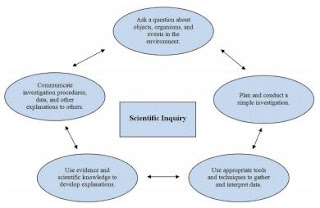Inquiry-Based Instruction
Inquiry-Based Instruction is a buzz term that I have heard since I joined the Agricultural and Extension Education major at Penn State. Inquiry-Based Instruction is vital in the agriculture education system because it is able to incorporate math, science, reading and writing elements into the classroom. It also combines scientific method and critical thinking.
According to the National Academy of Science they say that students learn how to ask questions and use evidence to answer them. When students learn through inquiry, they: 1) question; 2) investigate; 3) use evidence to describe, explain, and predict; 4) connect evidence to knowledge; and 5) share findings. Check out this website to learn more about the National Academy of Science position statement on inquiry based learning (National Science Teachers Association - NSTA. (2004, October). NSTA Position Statement. Retrieved October 29, 2017, from http://www.nsta.org/about/positions/inquiry.aspx).
Example:
1) Question
Students in an Animal Science class are observing two calves that were born the same day. One calf is bigger than the other. This could make the students question "what is making calf A grow faster than calf B.
2) Investigate
The students know that in order for the calves to grow they need to consume food and water. However, they do some research to see what foods are important factors on calf growth. For one week the students observe calf A and calf B diets.
3) Use evidence to describe, explain, and predict
At the end of the one week the students review the data that was collected. They could not find a difference in the feed. The students then predict it is because calf A is a female and calf B is a male. So they decide to monitor their weight.
4) Connect evidence to Knowledge
The students check calf A and calf B weight everyday to see if they gained or lost weight.
5) Share Findings
They can conclude that the sex of an animal is a cause of growth for calves.



Heather, I love your animal science IQB example! How or where do you see yourself using IQB in your classroom? What are some ways that we can incorporate it into SAEs and FFA?
ReplyDeleteGreat examples of inquiry, Heather! Will you include any of those "problem questions" in class during your student teaching experience?
ReplyDeleteLove this example Heather, my question for you is how will you make your students comfortable with inquiry based learning? What challenges have you worried about using this style of teaching?
ReplyDeleteGood reflection Heather! I like that example... Shows how agriculture is so investigative. What are some limitations to IBI in the classroom? How do you foresee yourself overcoming these challenges?
ReplyDeleteHeather, I really enjoy your example that you provided! I also like that you mentioned that this term is something that we have been hearing for a while and now we finally get to dive into it!
ReplyDeleteHeather, I love your examples which connect inquiry to agricultural education. What are some specific examples of IBI that you will use in your future classroom?
ReplyDelete